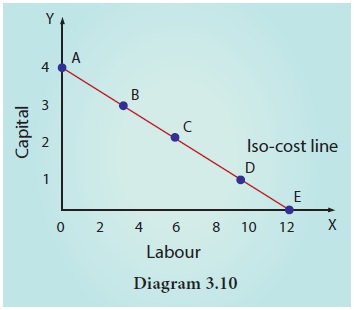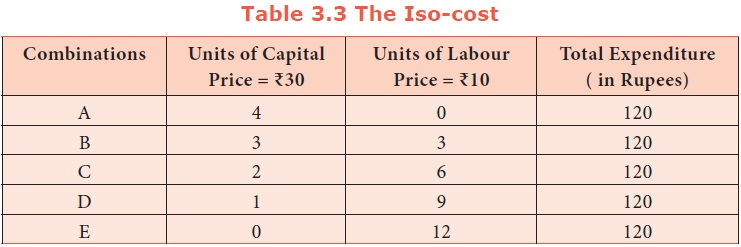Production Analysis | Economics - The Iso-cost Line | 11th Economics : Chapter 3 : Production Analysis
Chapter: 11th Economics : Chapter 3 : Production Analysis
The Iso-cost Line
The
Iso-cost Line
The
iso-cost line is an important component in analysing producer’s behaviour. The
iso-cost line illustrates all the possible combinations of two factors that can
be used at given costs and for a given producer’s budget.
Simply stated, an iso-cost line represents different combinations of inputs
which shows the same amount of cost. The iso- cost line gives information on
factor prices and financial resources of the firm. It is otherwise called as
“iso-price line” or “iso- income line” or “iso-expenditure line” or “total
outlay curve”.


Suppose
that a producer has a total budget of Rs.120 and for producing a certain level of
output, he has to spend this amount on two factors Labour (L) and Capital (K).
Prices of factors K is Rs. 30 and L is Rs.10. Iso Cost Curve can be drawn by using
the following hypothetical table.
As shown in Table, there are five combinations of capital and labour such as combination A represents 4 units of capital and zero units of labour and this combination costs Rs.120. Similarly other combinations (B,C,D and E) cost same amount of rupees ( Rs.120).
Symbolically,
4K + 0L= Rs..120
3K + 3L= Rs..120
2K + 6L= Rs..120
1K + 9L= Rs..120, and
0K + 12L=
Rs..120.
Thus, all
the combinations A, B, C, D and E cost the same total expenditure.
From the
figure 3.10, it is shown that the costs to be incurred on capital and labour
are represented by the triangle OAE. The line AE is called as Iso-cost line.
Related Topics